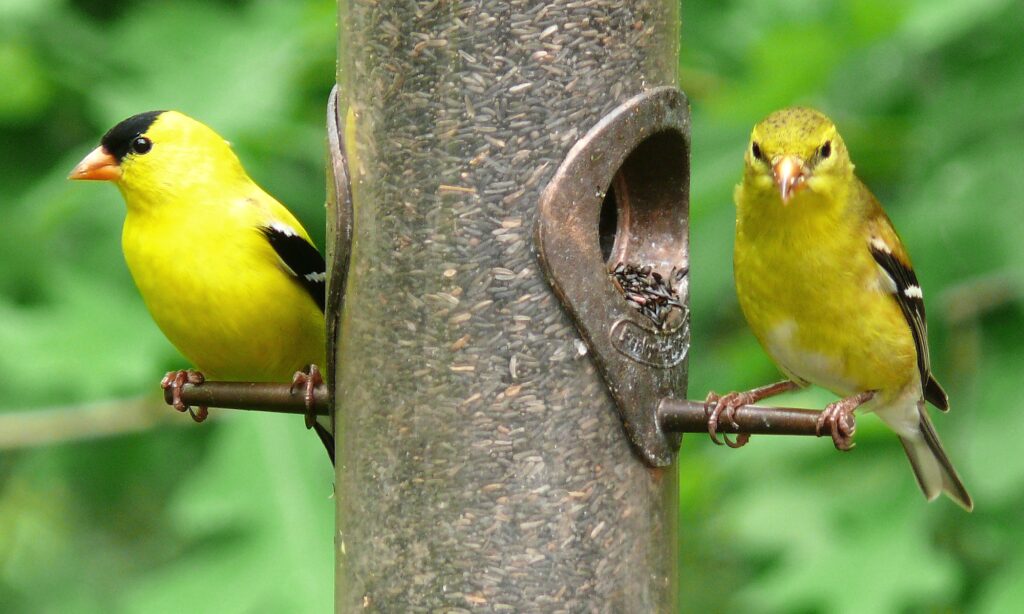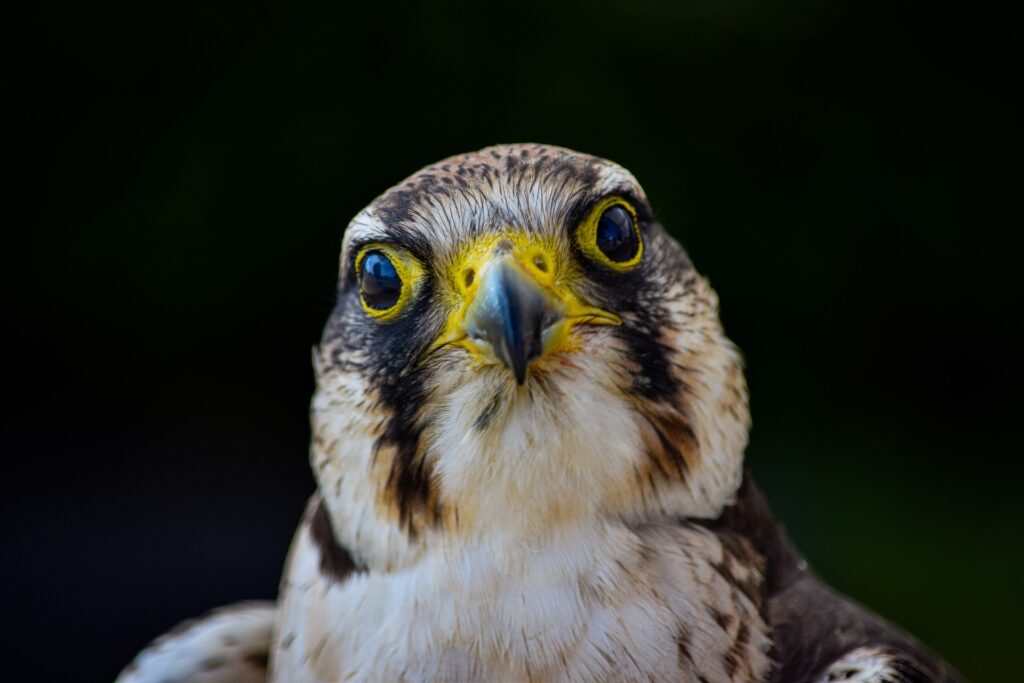People in many parts of the world feed birds in their backyards, often due to a desire to help wildlife or to connect with nature. In the United States alone, over 57 million households in the feed backyard birds, spending more than $4 billion annually on bird food.
While researchers know that bird feeding can influence nature, they do not know how it influences the people who feed those birds.
“Given that so many people are so invested in attracting birds to their backyard, we were interested in what natural changes they observe at their feeders beyond simply more birds,” said Ashley Dayer, an assistant professor in the Department of Fish and Wildlife Conservation in the College of Natural Resources and Environment at Virginia Tech. “In particular, we wanted to know how they respond to their observations. For example, how do they feel if they see sick birds at their feeders, and what actions do they take to address these observations?”
Researchers Ashley Dayer and Dana Hawley of Virginia Tech recently published their findings in People and Nature, a new journal published by the British Ecological Society.
The study was conducted in collaboration with researchers from the Cornell Lab of Ornithology and the Odum School of Ecology at the University of Georgia.
The researchers analyzed how people who feed birds notice and respond to natural events at their feeders by collaborating with Project FeederWatch, a program managed by the Cornell Lab of Ornithology that engages more than 25,000 people to observe and collect data on their backyard birds.
Using a survey of 1, 176 people who feed birds and record their observations of birds in the Project FeederWatch database, the researchers found that most people noticed natural changes in their backyards that could be due to feeding, including an increase in the number of birds at their feeders, a cat or hawk near their feeders, or a sick bird at their feeders.
“More and more, we see that humans are interacting less with nature and that more of our wildlife are being restricted to areas where there are humans around. Looking at how humans react to and manage wildlife in their own backyards is very important for the future of wildlife conservation and for understanding human well-being as the opportunities for people to interact with wildlife become more restricted to backyard settings,” said Hawley, an associate professor in the Department of Biological Sciences in the College of Science. Hawleys research program at Virginia Tech focuses on wildlife disease ecology and evolution.
“From my 17 years working with people who feed birds as part of citizen science projects, Ive heard a great deal about their impactful observations at their feeders,” said co-author David Bonter, director of Citizen Science at the Cornell Lab of Ornithology. “This study provides important information about the breadth and pattern of these experiences through responses of over 1,000 participants. The findings will help us at Project Feederwatch improve how we work with bird watchers toward our shared goal of bird conservation.”
The people who feed birds also responded, particularly to cats at their feeders, by scaring off the cats, moving feeders, or providing shelter for birds. When observing sick birds, most people cleaned their feeders. When observing more birds, people often responded by providing more food. Fewer people acted in response to seeing hawks; the most common response to this was providing shelter for the feeder birds. These human responses were, in some cases, tied to peoples emotions about their observations, particularly anger. While cats near feeders most commonly evoked anger, sick birds led to sadness or worry. Emotions in response to hawks were more varied.
“Feeding wild birds is a deceptively commonplace activity. Yet, it is one of the most intimate, private, and potentially profound forms of human interaction with nature. This perceptive study uncovers some of the remarkable depth associated with bird feeding and discerns that people who feed birds are alert to a wide range of additional natural phenomena,” said Darryl Jones, a professor at the Environmental Futures Research Institute and School of Environment and Sciences at Griffith University in Australia, who was not connected to the study.
One surprising result that the researchers found in this study was that when deciding how much to feed birds, people prioritized natural factors, such as cold weather, more than time and money. Most people believed that the effects of their feeding on wild birds was primarily good for birds, even though many observed and took action in response to natural events in their backyard that could impact the health of the birds and might partly result from their feeding.
“Overall, our results suggest that people who feed birds observe aspects of nature and respond in ways that may affect outcomes of feeding on wild birds. More work is needed to fully understand the positive and negative effects of feeding on wild birds and, thereby, the people who feed them,” said Dayer, whose research focuses on the human dimensions of wildlife conservation, applying social science to understand human behavior related to wildlife.
More information: Ashley A. Dayer et al, Observations at backyard bird feeders influence the emotions and actions of people that feed birds, People and Nature (2019). DOI: 10.1002/pan3.17
Birds Remember Your Kindness

Birds remember good deeds, whether they are hanging bird feeders, planting native berry bushes, or erecting bird houses and nest boxes. Indeed, they will frequently visit locations where they are aware of being welcomed. Additionally, certain untamed avian species, such as the amiable American Robin, closely observe when you replenish feeders and clean your birdbath. Indeed, a lot of people who feed the birds in their backyard say they have a remarkable ability to sense when the feeder needs to be refilled. That’s because they always have access to a consistent supply of food and water. It’s also due to their keen senses: wild birds listen for water to trickle and use their extraordinary vision to find even the tiniest seeds (as well as birds that are gathering and feeding). Therefore, don’t assume that your insignificant act of filling a bird feeder has gone unnoticed the next time!
Here’s how to build a backyard bird sanctuary that your feathered friends will want to visit again and again.
Birds Rememberand DislikeEye Contact

Were often told to look people in the eyewhether its on a date, in a job interview, or meeting a new friend. But in the wild bird world, direct eye contact signals danger. Thats because it mimics the gaze that a predator has on its prey. So when humans look directly at a bird, or even in their direction, birds take note. One UK study by the University of Bristol found that starlings kept away from their food dish if a human was gazing in its direction, only to feed as soon as the human looked elsewhere.
Crows, too, are very responsive to human eye contact. Research shows that when humans gaze directly at crows, they fly away with greater urgency than when humans approach them without a glance. Most birds dont care for direct eye contact from humans, so if youre looking to forge a bird bond, best avert your gaze.
One unexpected finding of this study was that people gave natural factorslike cold weathera higher priority than time and money when determining how much to feed birds. Even though many observed and responded to natural events in their backyard that could have an impact on the health of the birds and could partially result from their feeding, the majority of people thought that the effects of their feeding on wild birds were primarily positive for the birds.
“Feeding wild birds is a deceptively commonplace activity. However, it is among the most private, intimate, and possibly meaningful ways that people can engage with nature. “This insightful study reveals some of the amazing depth linked to bird feeding and discerns that individuals who feed birds are aware of a broad variety of additional natural phenomena,” stated Darryl Jones, an Australian professor at Griffith University’s School of Environment and Sciences and Environmental Futures Research Institute, who was not involved in the study.
The study was carried out in cooperation with scientists from the University of Georgia’s Odum School of Ecology and Cornell Lab of Ornithology.
Researchers Ashley Dayer and Dana Hawley from Virginia Tech recently released their research findings in the British Ecological Society’s new journal, People and Nature.
Use this form if you have come across a typo, inaccuracy or would like to send an edit request for the content on this page. For general inquiries, please use our contact form. For general feedback, use the public comments section below (please adhere to guidelines).
FAQ
Do birds tell other birds about bird feeders?
Do birds know when you’re trying to help them?
Can birds tell if you’re watching them?